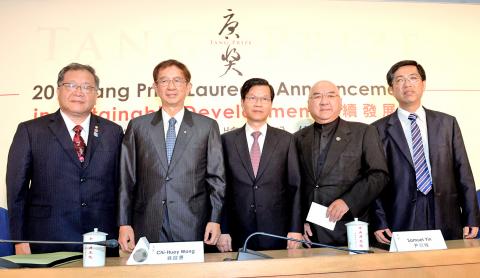Former Norwegian prime minister Gro Harlem Brundtland was awarded the first Tang Prize in Sustainable Development yesterday for “concept, leadership and implementation of sustainable development for the benefit of humanity.”
Brundtland, the “godmother of sustainable development,” chaired the World Commission on Environment and Development from 1984 to 1987. The commission — also called the Brundtland Commission in recognition of her leadership — coined the term “sustainable development” in a landmark report in 1987 titled Our Common Future.
The 75-year-old is to receive a cash prize of NT$40 million (US$1.33 million) and a research grant of up to NT$10 million to be used within five years, as well as a medal and a certificate at an award ceremony in September.

Photo: Lin Cheng-kung, Taipei Times
Our Common Future laid the groundwork for the 1992 Earth Summit in Rio de Janeiro, which produced a global action plan for sustainable development known as Agenda 21 and initiated the UN’s Framework Convention on Climate Change, which led to the 1997 Kyoto Protocol.
The report defined the term “sustainable development” as “development that meets the needs of the present without compromising the ability of future generations to meet their own needs.” The concept supports economic and social development, while also highlighting the importance of protecting the environment and natural resources.
In the report’s foreword, Brundtland wrote that the challenge of finding sustainable development paths should be the motivation for “a renewed search for multilateral solutions and a restructured international economic system of cooperation.”
“These challenges cut across the divides of national sovereignty, of limited strategies for economic gain and of separated disciplines of science,” she wrote, calling for “higher expectations, for common goals pursued together, for an increased political will to address our common future.”
The report compiled the views of hundreds of experts, scientists, industrialists and government and NGO representatives, as well as members of the public, and it continues to have a major impact on UN conferences, including the UN Conference on Sustainable Development and Conference of the Parties.
Born in 1939 in Oslo, Brundtland graduated with a medical degree from the University of Oslo and a holds master’s degree in public health from Harvard University.
She was Norwegian minister of the environment from 1974 to 1979 before becoming the first female Norwegian prime minister — and the youngest ever — in 1981.
She later served as director-general of the WHO from 1998 to 2003, during which time she was credited for helping to prevent the spread of SARS and gained recognition for successfully negotiating an agreement on tobacco control.
Brundtland served as UN special envoy on climate change from 2007 to 2010 and was on the UN secretary-general’s High-Level Panel on Global Sustainability from 2010 to 2012.
She serves as deputy chair of The Elders, a group of world leaders brought together in 2007 by former South African president Nelson Mandela to work for peace and human rights.
The Tang Prize was established in 2012 by entrepreneur Samuel Yin (尹衍樑) to honor leaders in four fields: sustainable development, biopharmaceutical science, Sinology and the rule of law.
The first prizes are being handed out this year.

Conflict with Taiwan could leave China with “massive economic disruption, catastrophic military losses, significant social unrest, and devastating sanctions,” a US think tank said in a report released on Monday. The German Marshall Fund released a report titled If China Attacks Taiwan: The Consequences for China of “Minor Conflict” and “Major War” Scenarios. The report details the “massive” economic, military, social and international costs to China in the event of a minor conflict or major war with Taiwan, estimating that the Chinese People’s Liberation Army (PLA) could sustain losses of more than half of its active-duty ground forces, including 100,000 troops. Understanding Chinese

The Ministry of Foreign Affairs (MOFA) yesterday said it is closely monitoring developments in Venezuela, and would continue to cooperate with democratic allies and work together for regional and global security, stability, and prosperity. The remarks came after the US on Saturday launched a series of airstrikes in Venezuela and kidnapped Venezuelan President Nicolas Maduro, who was later flown to New York along with his wife. The pair face US charges related to drug trafficking and alleged cooperation with gangs designated as terrorist organizations. Maduro has denied the allegations. The ministry said that it is closely monitoring the political and economic situation

UNRELENTING: China attempted cyberattacks on Taiwan’s critical infrastructure 2.63 million times per day last year, up from 1.23 million in 2023, the NSB said China’s cyberarmy has long engaged in cyberattacks against Taiwan’s critical infrastructure, employing diverse and evolving tactics, the National Security Bureau (NSB) said yesterday, adding that cyberattacks on critical energy infrastructure last year increased 10-fold compared with the previous year. The NSB yesterday released a report titled Analysis on China’s Cyber Threats to Taiwan’s Critical Infrastructure in 2025, outlining the number of cyberattacks, major tactics and hacker groups. Taiwan’s national intelligence community identified a large number of cybersecurity incidents last year, the bureau said in a statement. China’s cyberarmy last year launched an average of 2.63 million intrusion attempts per day targeting Taiwan’s critical

‘SLICING METHOD’: In the event of a blockade, the China Coast Guard would intercept Taiwanese ships while its navy would seek to deter foreign intervention China’s military drills around Taiwan this week signaled potential strategies to cut the nation off from energy supplies and foreign military assistance, a US think tank report said. The Chinese People’s Liberation Army (PLA) conducted what it called “Justice Mission 2025” exercises from Monday to Tuesday in five maritime zones and airspace around Taiwan, calling them a warning to “Taiwanese independence” forces. In a report released on Wednesday, the Institute for the Study of War said the exercises effectively simulated blocking shipping routes to major port cities, including Kaohsiung, Keelung and Hualien. Taiwan would be highly vulnerable under such a blockade, because it